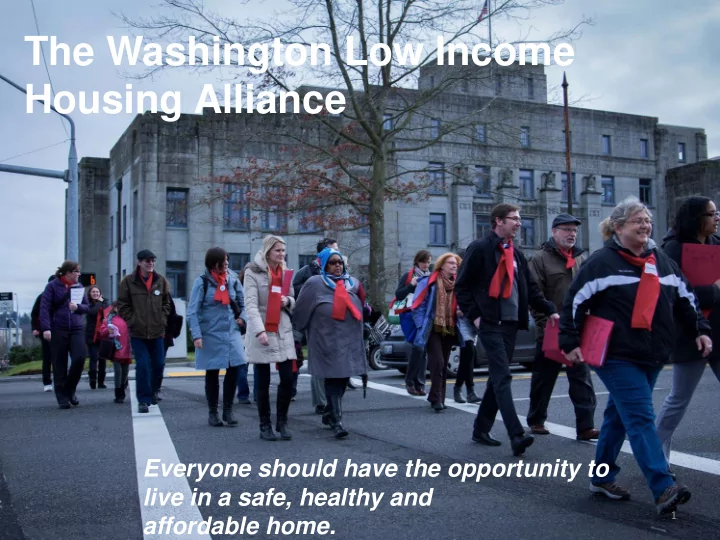

The Washington Low Income Housing Alliance Everyone should have the opportunity to live in a safe, healthy and 1 affordable home.
The Housing Alliance advances public policy that increases access to safe, healthy and affordable homes. Overview of HB 2578 – An Act Related to Ensuring Housing Options Michele Thomas, Director of Policy and Advocacy wliha.org I michele@wliha.org I 206-442-9455 2
Our Ask: Outlaw discrimination against tenants using income or rental assistance to help pay the rent. Outcome: HB 2578/Riccelli passed making discrimination illegal and creating a new statewide mitigation program while increasing local resources for affordable housing. 3
4
5
6
HB 2578: Broad Overview • Outlaws discrimination based on “source of income”. • Goes into effect September 30 th , 2018 • Establishes the new statewide Landlord Mitigation Program, administered by the Washington State Department of Commerce. • Funding source is a $3 increase to a document recording fee on real estate related documents, split 40/60 with counties who retain 60% of funds to invest in affordable housing (known as “2060 funds).
Definition of “source of income” Source of income includes benefits or subsidy programs including housing assistance, public assistance, emergency rental assistance, veterans benefits, social security, supplemental security income or other retirement programs, and other programs administered by any federal, state, local, or nonprofit entity. "Source of income" does not include income derived in an illegal manner. 8
Enforcement • Landlords in violation of this act are subject to up to four and half times the monthly rent, court costs and reasonable attorney fees. • The act is in the Residential Landlord Tenant Act. It is not under the purview of the Human Rights Commission. 9
More details • If source of income requires inspection of the property and repairs exceed $1,500, landlord doesn’t have to accept the tenant unless they access the mitigation fund to help pay for the repair cost. • If a landlord requires a threshold level of income, any source of income in the form of a rent voucher or subsidy must be subtracted from the total of the monthly rent prior to calculating if the income criteria have been met. • Discriminatory advertisements are also outlawed. 10
Mitigation Program Overview • State acts as guarantor for landlords renting to tenants with rental assistance. This helps equalize the private market since low income tenants don’t have any or much cash for deposits. • $5,000 in damages beyond normal wear & tear, and/or in lost rent or utilities are covered. • Repairs identified by an inspection that was required by the rental program are covered – landlord must put in first $500 in order to see reimbursement for up to $1,000. • Up to two weeks of lost rent if there is a delay in the tenant moving in due to the inspection. 11
More Details • Program is reimbursement only (not a grant program). • This portion of the bill goes into effect on June 7. • Department of Commerce is establishing the program and hopes to get it underway as soon as possible. 12
Key Things for Landlords to Know • Will not need a court judgment in order to make a claim, although can submit a court judgment if one exists. • Will need to sign under penalty of perjury that the claim is true. • Commerce is obligated to protect against fraud and abuse. Can inspect units at their discretion. • Claims must total at least $500 in order to be eligible. • Landlords must submit initial move-in report, signed and dated by both the landlord and tenant. 13
Key Things for Landlords to Know • Damages beyond normal wear and tear: “ Damages, beyond wear and tear, that are eligible for reimbursement include, but are not limited to: Interior wall gouges and holes; damage to doors and cabinets, including hardware; carpet stains or burns; cracked tiles or hard surfaces; broken windows; damage to household fixtures such as disposal, toilet, sink, sink handle, ceiling fan, and lighting. Other property damages beyond normal wear and tear may also be eligible for reimbursement at the department's discretion .” 14
Key Things for Landlords to Know • The Department must make reasonable efforts to review each claim within ten business days from the date it was received and properly submitted. • Claims are first come, first serve and subject to availability of funds. • The program is funded at approximately $3 million per biennium. • A landlord denied reimbursement may seek to obtain a judgment and resubmit the claim to the Department of Commerce for reconsideration. 15
Key Things for Landlords to Know • The Department must establish a website advertising the program. • The Department is required to prepare a report to the legislature on the effectiveness of the program and any suggested changes, due January 1, 2021. Must include input from landlord stakeholders in the report. • A landlord who accepts money from the program is prohibited from going after the tenant for any additional damages. 16
Key Contacts • Cary Retlin, The Washington State Department of Commerce cary.retlin@commerce.wa.gov • Michele Thomas, Washington Low Income Housing Alliance Michele@wliha.org 17
Recommend
More recommend